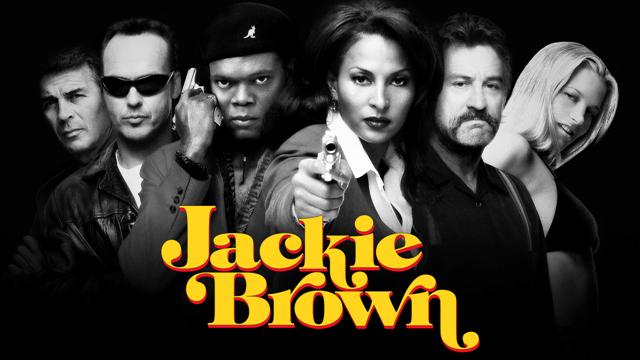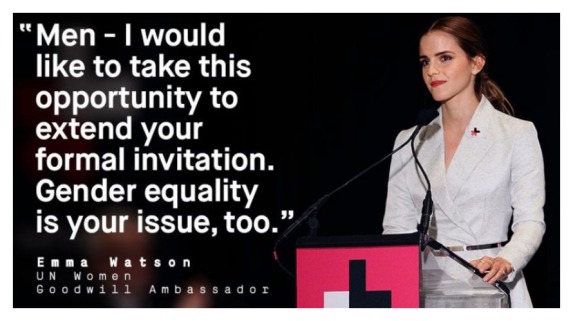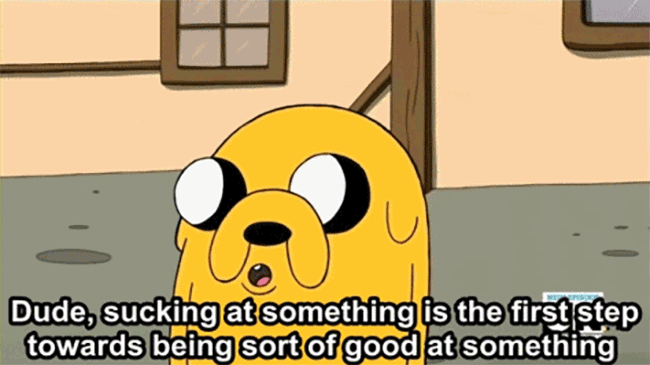
Last night I watched the Quentin Tarantino film Jackie Brown for the first time. This is noteworthy because I can now honestly say that I have seen every film written and directed by the great QT. However, it is also relevant to this blog because Quentin Tarantino is not only one of the best directors of our time, but one of the most successful writers of films with female leads.
From Mia Wallace in Pulp Fiction, to Jackie Brown in Jackie Brown, to Uma Thurman as The Bride in Kill Bill Volumes 1 and 2, Quentin Tarantino’s movies frequently feature women in strong leading roles. Especially in the case of The Bride in Kill Bill, it is clear that Quentin Tarantino is making a statement about gender.
Perhaps most notably, Kill Bill makes a very clear statement against rape. Throughout the film, The Bride can be seen brutally and violently exacting her revenge upon the perpetrators of this crime making it very clear that this behavior will not be tolerated. In this fast-paced action film, it is easy to accept immediate death as the proper punishment for this heinous crime.

Additionally, within the hidden society of assassins in Kill Bill it is clear that women are in charge. As the leader of the Yakuza crime syndicate, O-Ren Ishii surrounds herself with “an all female entourage.” In this way, as a movie, Kill Bill challenges the notion that organized crime requires male leadership and thereby affirms the independence of women. Furthermore,
“When all the fighting starts happening and the blood spills in earnest, it is the women who are formidable foes. They are the ones with personality. The men are expendable clones.”

In this way, it is the women, in Kill Bill, who represent serious threats in the fighting scenes. This is a phenomenon so rare that it is almost unique to this movie. As I discussed in an earlier blog post, even movies which do feature powerful female characters such as the marvel superhero movies, often prioritize male characters over female characters. However, in Kill Bill, this effect is reversed so that women really do hold the power and command the authority.
As significant as these elements of feminism are, it is interesting to note that, “It only takes a minute to get used to it and accept this as the new order of things.” In this way, watching Kill Bill doesn’t feel unrealistic or exaggerated. Contrastingly, it seems very natural. By simply creating the opportunity for women to be powerful and formidable characters, Quentin Tarantino’s ingenious screenplay allows for women to showcase their full potential as both leaders and warriors. While traditional activists for gender equality are not usually arguing for a woman’s right to be a samurai, I believe that Tarantino’s method of showcasing women in this arena is an effective way to challenge traditional gender norms and suggest a new way of thinking.
Uma Thurman to Bring ‘Pulp Fiction’ Back to Life Through Auction
http://giphy.com/gifs/kill-bill-o-ren-ishii-l41lRBLX3CoJ3vl8A


 In recently developing my thesis for an upcoming paper, I was thinking about the causes of gender inequity. After all, these issues surely must have a cause or they couldn’t possibly be so frequent. Ultimately, I realized that they must be influenced by an underlying sense of sexism that exists in our society. While not everyone is sexist, it is hard to deny that
In recently developing my thesis for an upcoming paper, I was thinking about the causes of gender inequity. After all, these issues surely must have a cause or they couldn’t possibly be so frequent. Ultimately, I realized that they must be influenced by an underlying sense of sexism that exists in our society. While not everyone is sexist, it is hard to deny that  Among all aspects of out popular culture, one which receives frequent criticism is the rap and hip/hop community. Known for its use of sexually explicit lyrics, rap music has been labeled sexist by countless critics. In her article, “
Among all aspects of out popular culture, one which receives frequent criticism is the rap and hip/hop community. Known for its use of sexually explicit lyrics, rap music has been labeled sexist by countless critics. In her article, “ considers rap music to be her favorite genre and says that it can be “fun and uplifting regardless of your gender.” However, she does not deny the presence of
considers rap music to be her favorite genre and says that it can be “fun and uplifting regardless of your gender.” However, she does not deny the presence of 


 While writing a
While writing a  This sort of source typically gives specific examples of ways in which males and females are treated unequally in the classroom. For example, in her article, “How Teachers’ Hidden Biases Are Hurting Our Girls,” Soraya Chemaly details the ways in which females are being discouraged from participating in STEM subjects. According to Chemaly’s research, females are graded more harshly than males on math and science tests. In this way, although females are outperforming males on average academically, it appears that they face a grading bias which might discourage them from entering into a STEM subject.
This sort of source typically gives specific examples of ways in which males and females are treated unequally in the classroom. For example, in her article, “How Teachers’ Hidden Biases Are Hurting Our Girls,” Soraya Chemaly details the ways in which females are being discouraged from participating in STEM subjects. According to Chemaly’s research, females are graded more harshly than males on math and science tests. In this way, although females are outperforming males on average academically, it appears that they face a grading bias which might discourage them from entering into a STEM subject.

 Last night, I attended the opening night showing of Marvel Studio’s latest production,
Last night, I attended the opening night showing of Marvel Studio’s latest production, 
 As some background knowledge, you should know that Deadpool the movie is being marketed as a love story. In this way, Marvel is hoping to increase ticket sales by cramming theaters full of couples. After seeing the film, I can confirm that it contains elements of romance. However, I found that these moments were frequently overshadowed by sexist remarks and occurrences. For example, at one point in the film, after some graphic violence, Deadpool remarks something like, “At this point your girlfriend is probably wondering how you convinced her to come to this movie.” In this way, it seemed that Deadpool was belittling the women in the audience, by joking about the fact that the movie’s content was more stereotypically masculine than feminine. Furthermore, Deadpool’s love interest and the film’s main female character seemed to be an archetype of a stereotypically helpless woman. Throughout the film, she was portrayed primarily as a sex object, who was unjustifiably loyal to Deadpool.
As some background knowledge, you should know that Deadpool the movie is being marketed as a love story. In this way, Marvel is hoping to increase ticket sales by cramming theaters full of couples. After seeing the film, I can confirm that it contains elements of romance. However, I found that these moments were frequently overshadowed by sexist remarks and occurrences. For example, at one point in the film, after some graphic violence, Deadpool remarks something like, “At this point your girlfriend is probably wondering how you convinced her to come to this movie.” In this way, it seemed that Deadpool was belittling the women in the audience, by joking about the fact that the movie’s content was more stereotypically masculine than feminine. Furthermore, Deadpool’s love interest and the film’s main female character seemed to be an archetype of a stereotypically helpless woman. Throughout the film, she was portrayed primarily as a sex object, who was unjustifiably loyal to Deadpool.




 In Shannon Mokoro’s “
In Shannon Mokoro’s “ In my limited experience, I have found that most articles on gender studies are much more heavily focused on specific areas of inequality than on the positive advantages of gender equality. Perhaps, this is because authors assume that these advantages are obvious, and listing them would be repetitive, or perhaps this is because authors simply do not feel the need to justify equality. Whatever the reason, I found that Mokoro’s emphasis of these benefits strengthened her argument by reminding me of arguments that I already agreed with and supported.
In my limited experience, I have found that most articles on gender studies are much more heavily focused on specific areas of inequality than on the positive advantages of gender equality. Perhaps, this is because authors assume that these advantages are obvious, and listing them would be repetitive, or perhaps this is because authors simply do not feel the need to justify equality. Whatever the reason, I found that Mokoro’s emphasis of these benefits strengthened her argument by reminding me of arguments that I already agreed with and supported. While none of these arguments is especially controversial, I believe that listing all of them together is an effective means of emphasizing their collective importance. To use this method in my own writing, I will have to try to be more consciously aware of assumptions that I am making. Then, I will have to evaluate if any of these assumptions are worth expanding upon in my writing.
While none of these arguments is especially controversial, I believe that listing all of them together is an effective means of emphasizing their collective importance. To use this method in my own writing, I will have to try to be more consciously aware of assumptions that I am making. Then, I will have to evaluate if any of these assumptions are worth expanding upon in my writing.
 Firstly, while both articles address the subject of gender inequality in sports, they each serve a different purpose, and the motivating force behind each article is made clear by its title. The first article, published in the Atlantic and written by Terrance F. Ross is entitled, “
Firstly, while both articles address the subject of gender inequality in sports, they each serve a different purpose, and the motivating force behind each article is made clear by its title. The first article, published in the Atlantic and written by Terrance F. Ross is entitled, “ s Kelly Wallace points out in her article, one of the largest issues facing women’s sports is the lack of support from fans of women’s athletics. As a matter of logistics, men’s sports receive greater resources and media attention than women’s sports because they are more profitable than women’s sports, and they are more profitable than women’s sports because there are more fans of men’s sports than of women’s sports. Therefore, Wallace proposes the simple solution of encouraging more attendance at women’s sporting events. However, potential fans are reluctant to attend due to the current stigma and lack of popular interest regarding women’s sporting events. In this way, improving the popularity of women’s sports is somewhat of a paradox since women’s sports are prevented from becoming more popular by their own lack of popularity. This phenomenon relates to the association between credibility and experience, and was the topic of
s Kelly Wallace points out in her article, one of the largest issues facing women’s sports is the lack of support from fans of women’s athletics. As a matter of logistics, men’s sports receive greater resources and media attention than women’s sports because they are more profitable than women’s sports, and they are more profitable than women’s sports because there are more fans of men’s sports than of women’s sports. Therefore, Wallace proposes the simple solution of encouraging more attendance at women’s sporting events. However, potential fans are reluctant to attend due to the current stigma and lack of popular interest regarding women’s sporting events. In this way, improving the popularity of women’s sports is somewhat of a paradox since women’s sports are prevented from becoming more popular by their own lack of popularity. This phenomenon relates to the association between credibility and experience, and was the topic of 




